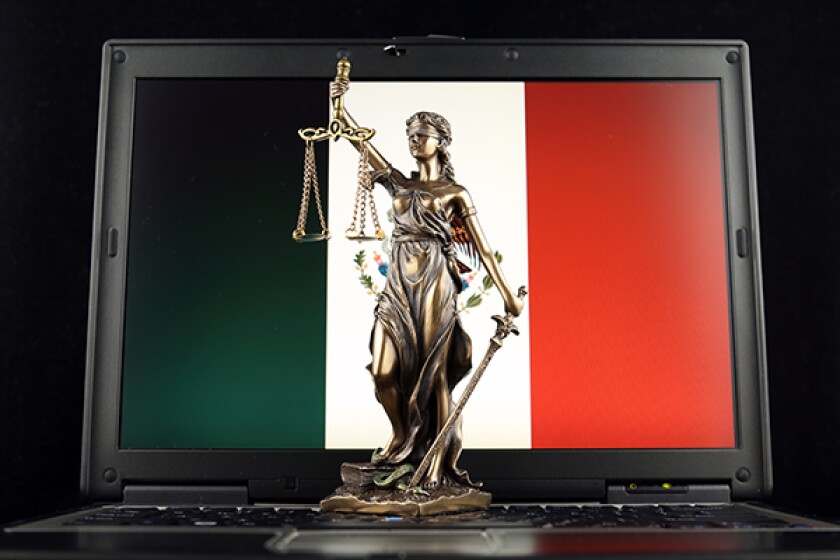A new law regulating industrial property rights in Mexico was published in the Official Gazette on July 1 2020.
In addition to notable improvements in respect to the protection of patents, trademarks and other industrial property rights, the new Federal Law for the Protection of Industrial Property has significantly altered the possibilities for claiming damages arising from the infringement of trademarks and other industrial property rights, making potential awards for such damages a far more realistic possibility.
Under the defunct Industrial Property Law, the owner of a registered trademark or other industrial property right had two options for seeking redress for infringement.
Two-step process for infringement
If the infringing conduct fell within one of the criminal prohibitions of the law, then a criminal complaint could be filed with a public prosecutor. In all other cases, the infringement claim would be brought with the Mexican Institute of Industrial Property (Instituto Mexicano de la Propiedad Industrial – IMPI).
|
|
“Awards for damages may only be issued by the IMPI after November 5 2021.” |
|
|
The same authority that would register trademarks and issue patents would be tasked with deciding on their infringement. However, the IMPI was not able to award damages, but only to impose fines and other punishments. Thus, the IMPI was able to deter and punish infringers but not to provide an adequate remedy for the damages caused by the infringement.
Instead, and as per interpretation from the Supreme Court of Mexico, the plaintiff in an infringement case had to successfully conclude the infringement proceeding before the IMPI (and appeals thereof) and then commence civil proceedings to obtain an award for the damages caused by the infringing conduct found by the IMPI.
This two-step process in which the infringement was determined in one venue and the damages in another was slow and expensive as the owners of industrial property rights had to carry two separate proceedings to a favourable conclusion, each taking several years.
As a result, claims for damages for the infringement of industrial property rights were very rare and awards for such damages even more so. Therefore, potential plaintiffs in Mexico would be motivated into action by the intent to halt the infringement and punish the infringer, as obtaining damages was both expensive and unlikely.
Changes under the new law
The new Federal Law for the Protection of Industrial Property changed this situation. The owners of industrial property rights are now allowed to immediately file their claim for damages with a civil judge. They no longer need to go through the proceeding before the IMPI.
In addition, the IMPI is now allowed to award damages at the conclusion of infringement proceedings. Therefore, while under the prior law, the plaintiff had to go through the infringement proceeding before the IMPI and a civil proceeding before a judge to obtain an award for damages, under the new law either proceeding will do for awarding damages. This should make it significantly easier to pursue damages for the infringement of industrial property rights, though not necessarily to prevail and obtain the award for damages.
As per the transient articles of the Federal Law for the Protection of Industrial Property, the IMPI shall only be allowed to award damages in infringement proceedings initiated after November 5 2020. Moreover, a moratorium of up to one year is provided in respect to awards by the IMPI to make the necessary adjustments in budget and personnel to be able to award damages. Thus, awards for damages may only be issued by the IMPI after November 5 2021.
After this date, upon the favourable conclusion of infringement proceedings, the plaintiff may petition the IMPI to award damages and offer the evidence that sustains the request, proves that damages were caused by the infringement and justify the requested amount.
The infringer shall then be given a term of 15 days to reply and then, after carrying out any actions related to the evidence offered by the parties, the decision will be issued. The petition must be filed within a term of two years after the infringement proceedings are favourably concluded.
To determine if damages are awarded, it must be demonstrated that the plaintiff did in fact suffer damages and that there is a causal connection between the infringing conduct committed and such damages. It is not enough to prove that there was an infringement to a registered trademark or other right, but that such unlawful conduct caused damages to the plaintiff.
For instance, through documents and experts, the plaintiff could try to prove that he lost sales revenue, clients or that the value of the infringed trademark diminished or that even the value of the stock of the company was affected by the infringing conduct.
Proving that damages occurred and that they were caused by the infringing conduct is going to be one of the most difficult and contentious aspects for obtaining damages. Potential plaintiffs should be made aware that demonstrating that infringement occurred does not automatically entitle them to an award for damages and that evidence that damages were caused by the infringement is going to be necessary for obtaining the award.
If damages are awarded, the IMPI can then consider any legitimate indication of value in order to determine the amount, including:
The value of the legitimate good and services determined by their market value or retail price;
The profits lost by the plaintiff as a result from the infringement;
The profits obtained by the infringer as a result of the infringement;
The price that the infringer would have had to pay for a license considering the commercial value of the infringed rights and pre-existing licenses; and
The obligations imposed upon the infringer in the infringement proceeding and which the infringer cannot fulfill.
It shall be mentioned that the law provides for an award of no less than 40% of the legitimate indicator of value demonstrated by the plaintiff. Once the award for damages is issued by the IMPI the law provides that it may be executed by a federal judge if the infringer refuses to pay.
In respect to claiming damages directly before a civil judge, it is worth noting that there is concurrent jurisdiction, and that the plaintiff may file the claim before a federal or a state judge and we would look to the Federal Code of Civil Procedure or the respective state code to determine the applicable procedural rules.
Again, to obtain the award for damages it would be necessary not only to prove the alleged infringement, but that it caused damages to the plaintiff. Absent an agreement to the contrary between the parties or a tacit acceptance of jurisdiction, the court of the defendant's domicile would have jurisdiction to hear the claim for damages. If the parties agree to it in writing, arbitration is also permitted and the respective agreement to arbitrate the dispute over damages would be enforced by a Mexican judge.
While this new reform will make it easier to claim damages for the infringement of trademarks, patents and other industrial property rights, there are some concerns that have been expressed.
First, while it is true that it will be possible to claim damages directly before the civil courts and without need of a prior proceeding before the IMPI, the law provides that the defendant can still challenge the validity of the respective right and if so, the civil proceeding for damages will be stayed until the IMPI decides on the validity of the rights.
|
|
“The new provisions for damages are a step in the right direction.” |
|
|
Therefore, a viable defence strategy for the defendant when facing a civil proceeding for damages would be to simply challenge the right on which the claim is based with the IMPI and that would suffice to temporarily halt the civil proceedings, possibly for several years.
In addition, the constitutionality of having a government authority that does not belong to the judiciary award damages has been questioned and it is foreseeable that infringers subject to the proceeding for awarding damages before the IMPI will try to defend themselves by claiming this new proceeding is unconstitutional.
While the courts decide on the constitutionality of the proceeding, there will be a period of legal uncertainty in which plaintiffs will not know for certain whether or not the damages proceeding before the IMPI is worth attempting or if it will be considered unconstitutional.
The calculation of the damages award by the IMPI could also be problematic. Experts on the subject could point out that one of the easiest ways for infringers to keep delaying punishment is to challenge the decision from this authority finding infringement not only on the merits but also in respect to the amount of the fine imposed, arguing it is excessive and that the authority did not adequately consider the factors set forth in the law when calculating the fine.
Often, an infringer may repeatedly delay the conclusion of an infringement proceeding just by challenging the amount of the fine and asking for it to be reduced. It is likely that infringers will attempt to challenge awards for damages not only on the merits, but also on the calculation of the amount used by the IMPI and this may cause a delay.
Despite these issues, the new provisions for damages are a step in the right direction. Potential plaintiffs will have an additional incentive to incur in the time and expense of claiming infringement, whereas potential infringers might consider damages as an additional deterrent.
In conjunction with other factors such as much higher fines and authorising the IMPI to compel their payment, the new law and its mechanisms for awarding damages constitute an important effort in the fight against infringement.
Hopefully, the first uses of the new provisions and particularly the proceeding for the IMPI to award damages and the defences and challenges raised by infringers thereof will help clear the uncertainties and provide further incentives for enforcement.
For the time being, the parties to a potential litigation regarding the infringement of industrial property rights ought to know that claiming damages is now a realistic possibility and a potential additional liability for infringers, this with the disclaimer that demonstrating an infringement is not the same as demonstrating that it caused damages to the plaintiff and that this will be an important evidentiary issue to consider if damages are to be pursued.
Finally, it is worth noting that in order to obtain damages, the plaintiff must show that the public was informed of the plaintiff's rights. For instance, in the case of trademarks it must be shown that the plaintiff used the symbol ®, the expression 'marca registrada', the initials 'M.R.' or otherwise informed the public that the trademark is registered.
While this requirement already existed under the defunct Industrial Property Law, the new routes for claiming damages make compliance with this obligation far more relevant.

Eduardo Kleinberg
Partner
Basham Ringe y Correa
T: +52 55 5261 0400
Eduardo Kleinberg has been a partner at Basham Ringe y Correa since 2003 and managing partner since 2014. He is the head of the trademark, franchising and licensing practices and has vast experience in domestic and international matters.
Eduardo regularly advises clients in IP matters in general including negotiating and drafting contracts, filing and prosecuting trademarks and patents with the trademark office, due diligence and e-commerce issues relating to IP.
Eduardo has a master's degree in law from the University of Chicago. He is a member of professional IP-related organisations including INTA, IFA and ASIPI.

Santiago Zubikarai
Associate
Basham Ringe y Correa
T: +52 55 5261 0400
Santiago Zubikarai is an associate at Basham. He has been with Basham Ringe y Correa since 2009 and his practice focuses on IP matters.
Santiago regularly advises on trademark prosecution and litigation, domain name disputes, copyright, and trademark licensing.
Santiago obtained a bachelor's degree in law from the Universidad Anahuac with the Ceneval Award for Academic Excellence EGEL and a LLM from the University of Notre Dame du Lac.













